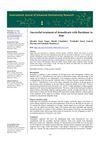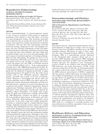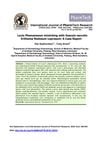 January 2024 in “Journal of advanced research in Medical and Health science”
January 2024 in “Journal of advanced research in Medical and Health science” People with severe and long-lasting alopecia areata often have low vitamin D levels, and treatments with vitamin D-like substances might help.
 January 2024 in “International journal of advanced biochemistry research”
January 2024 in “International journal of advanced biochemistry research” Fluralaner effectively cured dogs with severe skin issues caused by mites.
 January 2024 in “JAAD case reports”
January 2024 in “JAAD case reports” Netherton syndrome can cause severe and chronic vulvovaginal symptoms that may improve with continuous oral contraceptives.
 January 2024 in “International journal of advanced biochemistry research”
January 2024 in “International journal of advanced biochemistry research” Fluralaner successfully treated dogs with severe demodicosis in 2 months.
 December 2023 in “Journal of dermatology”
December 2023 in “Journal of dermatology” Adults and adolescents with severe alopecia areata are willing to take significant health risks for a better chance of hair regrowth.
 November 2023 in “Annales de dermatologie et de vénéréologie, FMC”
November 2023 in “Annales de dermatologie et de vénéréologie, FMC” Baricitinib effectively treats severe alopecia for up to 104 weeks.
 November 2023 in “British Journal of Dermatology”
November 2023 in “British Journal of Dermatology” Different people with severe hair loss respond to baricitinib treatment at different times, with some showing improvement early, some gradually, and others later.
 November 2023 in “JEADV Clinical Practice”
November 2023 in “JEADV Clinical Practice” Patients with severe alopecia areata felt better and less anxious or depressed when treated with baricitinib compared to placebo.
 November 2023 in “Scholars academic journal of biosciences”
November 2023 in “Scholars academic journal of biosciences” Trichotillomania can cause severe complications like hairballs in the stomach, needing surgery and psychiatric care.
 October 2023 in “Journal der Deutschen Dermatologischen Gesellschaft”
October 2023 in “Journal der Deutschen Dermatologischen Gesellschaft” Pregnancy can trigger severe rosacea, which may be treated with antibiotics and steroids, but there's no clear treatment guideline.
 October 2023 in “Acta dermato-venereologica (Print)”
October 2023 in “Acta dermato-venereologica (Print)” People with severe hair loss have lower zinc levels in their blood.
June 2023 in “Nephrology Dialysis Transplantation” Enteric hyperoxaluria can cause severe kidney failure after bowel surgery.
 May 2023 in “International Journal of Trichology”
May 2023 in “International Journal of Trichology” Tofacitinib effectively treated severe hair loss in a patient who didn't respond to other treatments.
 April 2023 in “International Journal of Community Medicine and Public Health”
April 2023 in “International Journal of Community Medicine and Public Health” Older people with severe COVID-19, especially those with certain health conditions, are more likely to experience post-COVID syndrome.
 October 2022 in “International journal of research and review”
October 2022 in “International journal of research and review” A man had severe stomach issues after a dental treatment with Formacresol, which improved with a different medication.
 September 2022 in “Plastic and Reconstructive Surgery”
September 2022 in “Plastic and Reconstructive Surgery” Baricitinib helps with severe hair loss, negative-pressure therapy lowers hernia recurrence, tranexamic acid reduces bleeding, robot-assisted breast surgery may improve outcomes, and acellular dermal matrix could decrease breast reconstruction complications.
 July 2022 in “International journal of dermatology, venereology and leprosy sciences”
July 2022 in “International journal of dermatology, venereology and leprosy sciences” More frequent and severe skin problems are linked to higher daily alcohol consumption.
 March 2022 in “Research Square (Research Square)”
March 2022 in “Research Square (Research Square)” A girl with severe hair loss saw hair regrowth after using cannabis.
 October 2021 in “QJM: An International Journal of Medicine”
October 2021 in “QJM: An International Journal of Medicine” People with severe hair loss have higher levels of a protein called interleukin 17 in their blood.
September 2021 in “Authorea (Authorea)” Systemic lupus erythematosus caused severe abdominal issues in a Sudanese woman.
 July 2021 in “Journal of emerging technologies and innovative research”
July 2021 in “Journal of emerging technologies and innovative research” Ayurvedic methods successfully treated severe acne in a patient.
 May 2021 in “Journal of the Endocrine Society”
May 2021 in “Journal of the Endocrine Society” A woman's severe hormone imbalance after menopause led to finding a rare ovarian tumor, treated by surgery.
 April 2021 in “European medical journal”
April 2021 in “European medical journal” A COVID-19 patient had severe and long-lasting skin issues and unusual hair loss.
Lupus nephritis can cause severe kidney and blood vessel problems.
December 2020 in “Rossijskij žurnal kožnyh i veneričeskih boleznej” People with severe alopecia areata often have lower vitamin D levels and may have other autoimmune or allergic conditions.
 December 2020 in “Benha Journal of Applied Sciences”
December 2020 in “Benha Journal of Applied Sciences” People with severe acne tend to have higher levels of betatrophin.
 August 2020 in “Ugeskrift for Læger”
August 2020 in “Ugeskrift for Læger” A man with severe hair loss regrew all his hair using tofacitinib and stayed healthy for a year.
 July 2020 in “Benha Medical Journal”
July 2020 in “Benha Medical Journal” People with severe Alopecia Areata have higher levels of TGF-β1, which may play a role in the condition.
 April 2020 in “Journal of the Endocrine Society”
April 2020 in “Journal of the Endocrine Society” A woman's severe hirsutism was caused by Leydig cell tumors in her ovaries, which improved after surgery.
 January 2020 in “International Journal of PharmTech Research”
January 2020 in “International Journal of PharmTech Research” A man with severe leprosy developed painless ulcers and numbness, treated successfully with multiple drugs and vitamins.

























